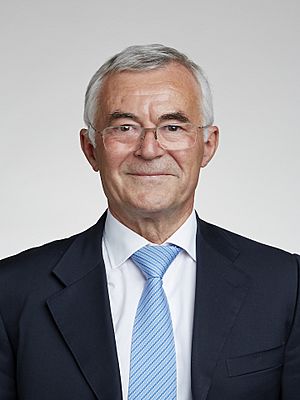Rino Rappuoli facts for kids
Quick facts for kids
Rino Rappuoli
|
|
|---|---|

Rappuoli in 2016
|
|
| Born | 4 August 1952 Radicofani, Italy
|
| Scientific career | |
| Fields |
|
Rino Rappuoli, born on August 4, 1952, is a famous Italian scientist who studies the body's immune system. This field is called immunology. He is a top leader in creating new vaccines at a big company called GlaxoSmithKline (GSK) Vaccines. Before this, he worked at important places like Rockefeller University and Harvard Medical School. He has spent his career helping to develop vaccines that protect people from diseases.
Contents
His Early Life and Learning
Rino Rappuoli studied biological sciences at the University of Siena in Italy. He earned both his bachelor's and doctoral degrees there.
A Career in Vaccine Science
Rino Rappuoli is known around the world for his important work on vaccines and how our bodies fight off sickness. He helped start a new area of science called cellular microbiology. This field combines the study of tiny living things (microbiology) with how cells work (cell biology).
He also created a new way to develop vaccines called reverse vaccinology. Imagine you want to build a house. Usually, you draw plans first. Reverse vaccinology is like looking at the finished house (a germ's genetic code) and then figuring out how to build a vaccine from that information. This method helps scientists find new ways to make vaccines faster.
Important Vaccine Discoveries
Dr. Rappuoli led the creation of several key vaccines. These include:
- Special influenza (flu) vaccines that use something called an "adjuvant" to make them work better.
- A vaccine called MENJUGATE(R) that protects against a serious illness caused by meningococcal-C bacteria.
- The first vaccine against pertussis (whooping cough) that uses a part of the bacteria, not the whole thing.
He has also worked on new vaccines for other types of meningococcal disease. He also helped develop vaccines for avian influenza (bird flu) and flu pandemics, which are widespread outbreaks.
Working with Big Companies
In 1992, Dr. Rappuoli joined a company called Chiron. He became the head of vaccine research in Europe. This happened when Chiron bought an Italian vaccine company called Sclavo SpA, where he used to be the head of research. Later, he was the global head of vaccine research for Novartis Vaccines & Diagnostics. Since 2015, Dr. Rappuoli has been the chief scientist and head of external research and development for GlaxoSmithKline's vaccine division. He is based in Siena, Italy.
Key Achievements in Vaccine Development
Throughout his career, Dr. Rappuoli has made many breakthroughs. Some of his major achievements include:
- Developing a special protein called CRM197. This protein is now used in vaccines for diseases like Haemophilus influenzae, Neisseria meningitidis, and pneumococcus.
- Creating a pertussis vaccine that is "acellular." This means it uses only parts of the bacteria, making it safer. It contains a special pertussis toxin that has been made harmless.
- Developing the first "conjugate vaccines" against meningococcus. These vaccines link a weak part of the germ to a stronger carrier, helping the immune system recognize it better.
- Creating MF59 adjuvant for influenza vaccines. This substance helps the vaccine create a stronger immune response.
- Developing a vaccine for meningococcus B using information from the germ's genome (its complete set of genetic instructions).
He has also introduced new scientific ideas. These include "genetic detoxification" in 1987, "cellular microbiology" in 1996, "reverse vaccinology" in 2000, and the concept of a "pan-genome" in 2005. A pan-genome looks at all the genes found in different strains of a species, not just one.
Awards and Recognition
Dr. Rappuoli has received many important awards for his work. In 1991, he was given the Paul Ehrlich and Ludwig Darmstaedter Prize. He is also a member of many international science groups, like the European Molecular Biology Organization. In 2005, he was chosen to be a member of the National Academy of Sciences in the United States.
He also received the Italian President Gold Medal in 2005 and the Albert Sabin Gold Medal in 2009. In 2013, he was named one of the most influential people in the world in the field of vaccines. In 2015, he became a Fellow of Imperial College London Faculty of Medicine and received the Maurice Hilleman Award.
In 2016, he was elected a Foreign Member of the Royal Society, which is a very high honor for scientists in the United Kingdom. In 2017, he received the European Inventor Award for his "Lifetime achievement" from the European Patent Office. Most recently, in 2019, he was awarded the Robert Koch Prize.

